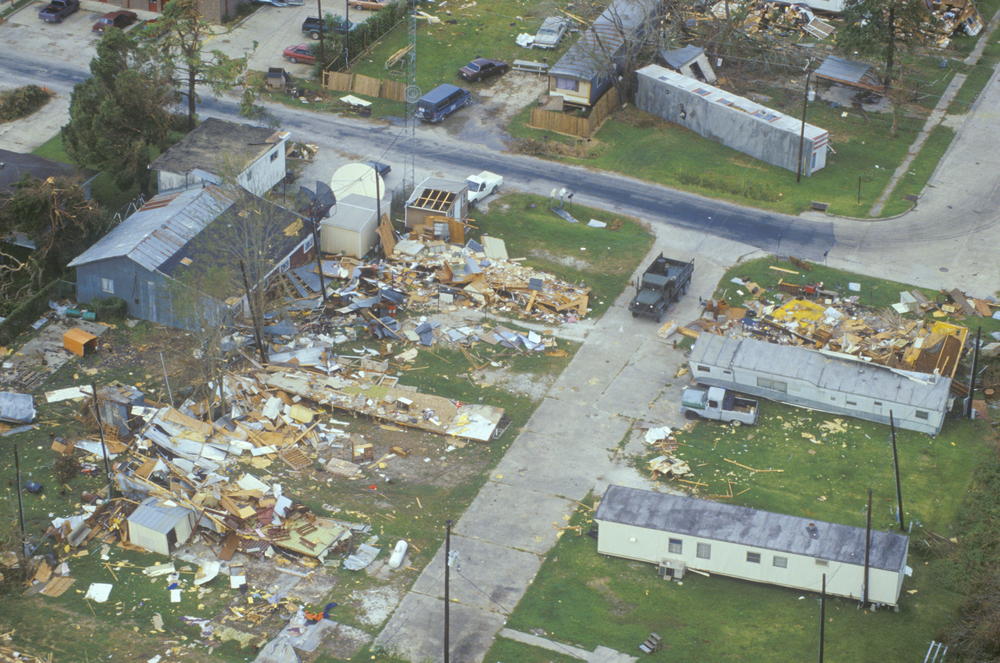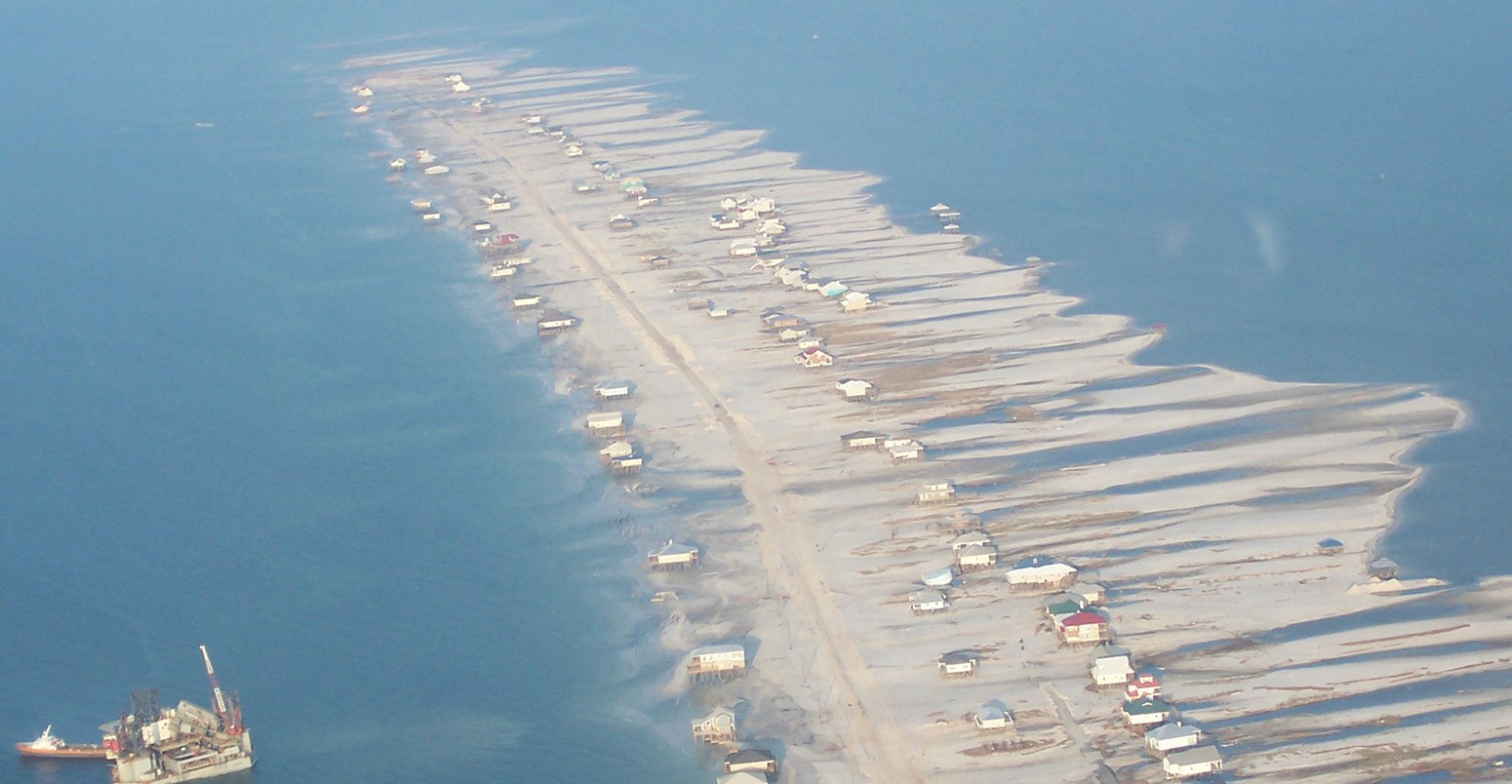Climate change adding to hurricane damage costs, study suggests
Robert McSweeney
10.20.15Robert McSweeney
20.10.2015 | 5:22pmHurricane damage along the US Atlantic coast has been on the rise in recent decades. Research has suggested that costs are increasing because there are more people and more expensive infrastructure sitting in harm’s way along the coast.
But a new study says this upward trend in hurricane damage could be partly down to rising global temperatures. The researchers estimate that in 2005, 2-12% of economic losses from hurricanes may have been caused by climate change, totalling $2-14bn.
Competing factors
Hurricanes are tropical storms that form in the North Atlantic or Northeast Pacific, with wind speeds reaching 33 metres per second or more. Approximately six hurricanes form in the North Atlantic Ocean each year, but it has been as few as two and as many as 15. Those that hit land, such as Hurricane Katrina in 2005, can be devastating.
Hurricanes cause more costly damage in the US than any other natural disaster – accounting for around two-thirds of insurance claims for property damage from such events. And they’re getting more expensive. Once adjusted for inflation, the cost of hurricane damages between 1900 and 2005 shows a clear increase, says an earlier study.
But working out what is causing this increase in damages is tricky.
The US population more than tripled during the 20th century, and property values increased by 150% between 1890 and 2012 (again, accounting for inflation). That means, in theory, more people and more valuable property are exposed to a hurricane in the year 2000 compared to the same hurricane in 1900.
On the other hand, with better building standards and better forecasts of impending storms, people today have a better chance of preparing for, and withstanding, a hurricane – which should mean less damage when one strikes.
The majority of studies that attempts to pick their way through these competing elements have concluded that, on balance, the losses outweigh the gains and that these “societal” changes are the reason why hurricane damage costs are on the up.
But the new study, published in Nature Geoscience, finds that the changes in population and wealth can’t fully explain the rising damage costs after all. Increasingly intense and frequent hurricanes as a result of climate change could also be contributing, say the authors.
 An aerial view of some damage caused by Hurricane Andrew in 1992. Credit: Joseph Sohm/Shutterstock.com.
An aerial view of some damage caused by Hurricane Andrew in 1992. Credit: Joseph Sohm/Shutterstock.com.
Observed trend
The new study uses a branch of statistics called regression analysis. This allows the researchers to analyse different datasets and identify how various factors relate to each other.
Using this approach, they find that most of the increase in hurricane damages from 1900 to 2005 is caused by rising population and wealth in the most risk-prone areas on the US Atlantic coast. This result is the same as earlier studies, lead author Dr Francisco Estrada, from the Universidad Nacional Autónoma de México, tells Carbon Brief.
But they find one crucial difference from earlier research, says Estrada:
“However, in contrast with most of the published studies, we show that societal change alone cannot explain the observed trend in these losses.”
After analysing hurricane datasets for the US, the researchers conclude that the missing factor could be an increase in the intensity and number of hurricanes in the North Atlantic.
Estrada says:
“There is a residual trend after adjusting for increase in wealth and population is consistent with observed warming, changes in the number and intensity of tropical cyclones in the North Atlantic basin and in the number of loss-generating landfalling events.”
The contribution to rising costs is small, the study finds. In 2005, for example, it says that around 2-12% of annual hurricane losses could be a result of climate change.
In its latest Assessment Report, the Intergovernmental Panel on Climate Change (IPCC) concluded that is was “virtually certain” that the frequency and intensity of the strongest hurricanes has increased since the 1970s.
But the new research doesn’t go as far as proving the link between climate change and hurricane damages, says Dr Friederike Otto, a senior researcher at the University of Oxford who wasn’t involved in the study. She tells Carbon Brief:
“Pointing out that if you get a trend it is consistent with a trend in global warming is not really helpful. And particularly not in the context of loss and damage, as it explicitly does not show that the losses and damages are due to anthropogenic climate change.”
This doesn’t mean there isn’t a link, just that this study doesn’t prove one.
 Building destroyed after hurricane Wilma in Miami, Florida in 2005. Credit: Claudio Lovo/Shutterstock.com.
Building destroyed after hurricane Wilma in Miami, Florida in 2005. Credit: Claudio Lovo/Shutterstock.com.
Uncertainty
Attempting to quantify all the different factors behind hurricane damages is a challenging problem, Dr Richard Katz, a senior scientist at the National Center for Atmospheric Research in Colorado, tells Carbon Brief. Katz wasn’t involved in the study, but has published research on the same topic. He says is uncertainty in these sorts of studies is unavoidable:
“One wonders whether the resultant trend in regression-adjusted damage actually represents climate change or just a failure to adequately capture this relationship.”
While the researchers acknowledge that their work doesn’t prove an influence from climate change on hurricane losses, Estrada says their findings mean it can’t be ruled out either:
“Our paper reopens the debate about the existence of a climate change signal not only in tropical cyclone losses in the US, but also regarding the potential existence of such a trend in other types of extreme events and in different locations.”
Main image: Dauphin Island damaged by Hurricane Katrina in 2005. Credit: toadbarracuda/Flickr.
Estrada, F. et al. (2015) Economic losses from US hurricanes consistent with an influence from climate change, Nature Geoscience, http://nature.com/articles/doi:10.1038/ngeo2560
-
Climate change is adding to hurricane damage costs, a new study suggests
-
Up to $14bn of hurricane damage in 2005 could be a result of climate change, study says


